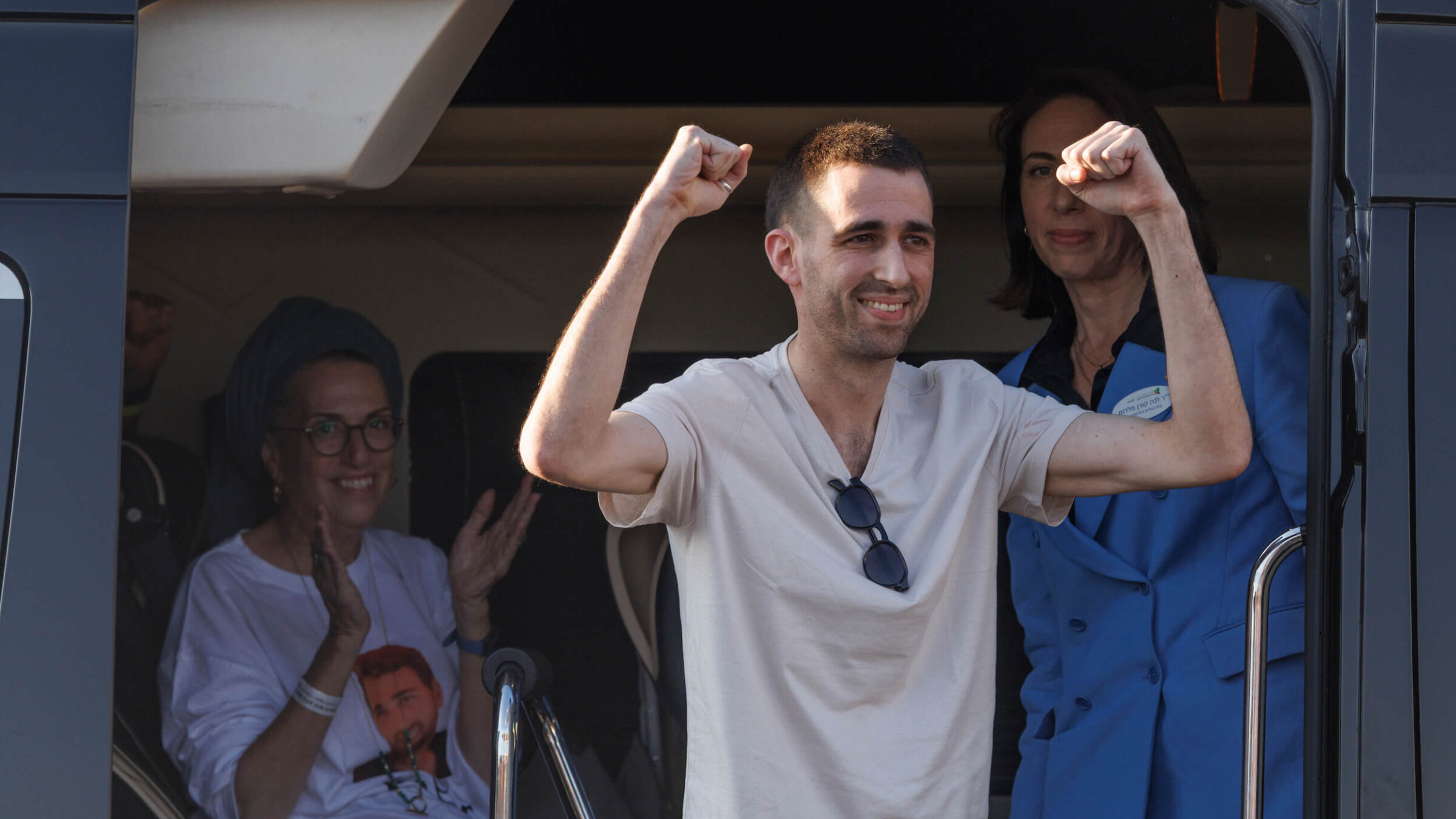The hostages are home. The fight for their future is far from over
It’s time to celebrate — and also time to plan

Former Israeli hostage Avinatan Or gestures as he arrives at the Beilinson hospital in Petach Tikva, near Tel Aviv, Oct. 13. Photo by Kobi Wolf/Bloomberg/Getty Images
With the release of the last surviving hostages from Gaza, the Jewish community has breathed a collective sigh of relief. In the days ahead, we’ll remove yellow ribbon pins from our clothing and tuck away hostage dog tags in our drawers.
But while this is a moment for celebration, it is also critical that we maintain the focus and sense of urgency of these last two years to ensure such a nightmare never happens again.
If we are sincere about preventing another Oct. 7, and that massacre’s two years of brutal aftermath, we cannot become complacent. We must ensure that the murders of Oct. 7, the suffering of the hostages and the killing of thousands of Gazan civilians are the last great tragedies of the Israeli-Palestinian conflict.
While the hostage issue is close to being fully resolved, with the return of the living hostages to Israel on Monday — the remains of dead hostages must still be returned — many challenging steps are left to be completed in the agreed-upon peace plan. Humanitarian aid must flood Gaza, with basic utility infrastructure reestablished as soon as possible. The strip must be rebuilt under a technocratic transitional government, while ensuring Hamas has no role in the territory’s future. And a political horizon must be set for Palestinian statehood and a pathway to lasting Israeli-Palestinian peace.
Most policy experts and analysts will say that the chances of the deal being completed as planned are slim. And it’s easy to imagine that these outstanding terms will lose the attention of the general public in the weeks, months, and years ahead.
But it is without a doubt in the interests of Israel and the global Jewish community alike to ensure the plan in its entirety reaches fruition.
While the barbarity of Oct. 7 shook us to our core, we must remember that, although it was one of the most horrific days in Israel’s history, the attack was a continuation of the ongoing cycle of violence that has fueled this conflict for decades. For years prior, periodic flare-ups and military escalations would garner international scrutiny. But when tensions decreased, attention would go elsewhere, leaving the status quo intact, and Israelis and Palestinians alike awaiting the next battle.
How do we finally break that cycle?
First, by lifting up Palestinian moderates and peacemakers. We must demonstrate that the pathway to freedom, peace and prosperity runs through diplomacy and pragmatism, not extremism and fanaticism.
And in our effort to be clear-eyed about the formidable obstacles that stand in the way of our righteous goals, we must reckon with the fact that those who hoped to prolong this conflict came not only from Hamas’ ranks, but also from within Israel and the Jewish community.
It is on all of us to reject extremists of all stripes — Palestinian and Israeli alike. We must remain vigilant against exploits by any actor that drive us further away from peace, be it terror attacks from Hamas, violence by Israeli settler extremists, or government-sanctioned land grabs in the West Bank.
If my words alone are not convincing, then I offer those of hostages and their family members — the people whose heart-wrenching stories have been seared into Jewish communal consciousness these past two years.
Rachel Goldberg-Polin, mother of the murdered hostage Hersh Goldberg-Polin, stated in a recent interview, “If there is something that can be done to move the entire region forward to get us out of this stuck, quicksand taffy that we’re entwined in — all of us in this region — we have to take that chance.”
Liat Beinin Atzili, a released hostage and widow of the murdered hostage Aviv Atzili, shared earlier this year what she had said to one of her captors: “There are 14 million people between the river and the sea. None of us is going anywhere. We have no choice but to figure out how to live here — even if not together — how to live here without killing each other.”
For the past two years, we’ve heard the phrase “there is no going back” after Oct. 7 become a cliche. It is on all of us, now, to make sure to fulfill the hopeful promise in those words — not the destructive one.
If we truly meant it — if we are committed to ensuring there are no more massacres, no more hostages and no more bloodshed — then we must honor the words and wishes of those in our community who have borne the heaviest costs of this conflict. It’s time to advocate as fervently for the full implementation of this peace deal as we have for the rescue of the hostages.
Because while the pins and dog tags may come off now, we are still fighting for them.
















